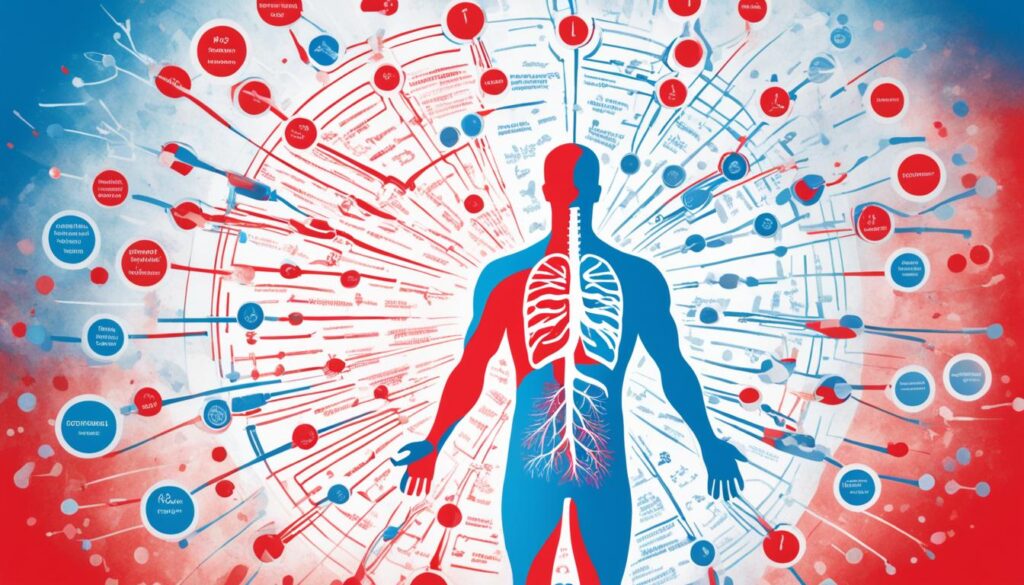Welcome to our comprehensive guide on hormonal imbalance treatments. Hormonal imbalances can have a significant impact on both men and women, affecting various aspects of their overall health and well-being. In this article, we will explore the causes, symptoms, and treatment options for hormonal imbalances, empowering you with the knowledge to find balance in your hormones naturally, with supplements, or through hormone replacement therapy.
Hormonal imbalances can manifest in a multitude of symptoms that can disrupt your daily life. These symptoms may include erratic heart rate, unexplained weight fluctuations, chronic fatigue, gastrointestinal issues, numbness and tingling sensations, high cholesterol levels, mood disorders such as depression or anxiety, temperature sensitivity, skin and hair problems, irregular body fat distribution, and more. It’s important to identify these symptoms and seek appropriate treatment to restore hormonal balance.
Various factors can contribute to hormonal imbalances, such as tumors or growths affecting the endocrine glands, damage or injury to the glands themselves, autoimmune conditions, and even medication. Understanding the underlying cause is crucial in developing an effective treatment plan tailored to your specific needs.
Throughout this guide, we will delve into the symptoms of hormonal imbalances, their impact on weight gain and anxiety, and explore the various causes behind these imbalances. We will also discuss the role hormones play in the body and how fluctuating levels can affect your overall health.
Our aim is to provide you with the information you need to comprehend hormonal imbalances fully. Armed with this knowledge, you can take the necessary steps towards finding balance and improving your overall well-being. Remember, consulting with a healthcare provider is essential in diagnosing and treating hormonal imbalances effectively. Let’s get started on this journey to finding equilibrium.
Key Takeaways:
- Identify the symptoms of hormonal imbalances, such as fatigue, weight fluctuations, mood disorders, and skin problems.
- Understand the possible causes of hormonal imbalances, including tumors, glandular damage, autoimmune conditions, and medication.
- Recognize the impact of hormonal imbalances on weight gain and anxiety.
- Learn about different treatment options, including hormone therapy, natural remedies, supplements, diet, and exercise.
- Consult with a healthcare provider to determine the underlying cause of your hormonal imbalance and develop a personalized treatment plan.
Symptoms of Hormonal Imbalances: Knowing the Signs.
Hormonal imbalances can lead to a variety of symptoms depending on the specific hormone affected. It’s important to recognize these signs to identify and address the underlying issue. Here are some common symptoms associated with hormonal imbalances:
Metabolic Symptoms of Hormonal Imbalances
- Slow or rapid heartbeat
- Unexplained weight changes
- Fatigue
- Digestive issues
- Numbness and tingling in the hands
- High cholesterol levels
- Depression or anxiety
- Temperature sensitivity
- Skin problems
Sex Hormone Imbalance Symptoms in Females
- Acne
- Hair loss
- Heavy or irregular periods
- Hirsutism (excess body hair)
- Hot flashes
- Infertility
- Loss of interest in sex
- Vaginal atrophy
- Vaginal dryness
Sex Hormone Imbalance Symptoms in Males
- Decrease or loss of body hair
- Erectile dysfunction
- Gynecomastia (enlarged breast tissue)
- Infertility
- Loss of interest in sex
- Loss of muscle mass
- Changes in mood and energy levels
Recognizing these symptoms is the first step toward understanding and addressing hormone imbalances. If you experience any of these signs, it is recommended to consult with a healthcare provider for a proper diagnosis and personalized treatment plan.

Can Hormone Imbalance Influence Weight Gain and Anxiety?
Hormone imbalances can have a significant impact on both weight gain and anxiety. Several conditions and hormonal changes can contribute to these issues.
Weight Gain:
Hormonal imbalances can disrupt the body’s metabolism, leading to weight gain. Conditions such as hypothyroidism, Cushing’s syndrome, and menopause can cause changes in metabolism and promote weight gain. Let’s take a closer look at how these hormonal imbalances affect weight:
- Hypothyroidism: The thyroid gland plays a crucial role in regulating metabolism. When the thyroid hormone levels are low, as seen in hypothyroidism, the body’s metabolism slows down, making it easier to gain weight.
- Cushing’s Syndrome: This condition is characterized by excess cortisol production. Cortisol, known as the stress hormone, can lead to weight gain, particularly in the abdominal area.
- Menopause: During menopause, hormonal fluctuations can disrupt the balance of estrogen and progesterone, leading to weight gain. Women often experience an increase in abdominal fat and a decrease in muscle mass.
Anxiety:
Hormonal imbalances can also contribute to anxiety and related symptoms. Imbalances in cortisol and thyroid hormones can play a role in the development or exacerbation of anxiety. Here are a few examples:
- Hyperthyroidism: When the thyroid gland produces an excessive amount of thyroid hormones, it can lead to symptoms such as anxiety, irritability, and restlessness.
- Cushing’s Syndrome: Excess cortisol production can trigger anxiety symptoms, including feelings of unease, nervousness, and an increased sense of fear or danger.
- Adult-Onset Growth Hormone Deficiency: Growth hormone plays a role in mood regulation. Deficiencies in growth hormone can contribute to anxiety and mood disorders.
While hormone imbalances can influence weight gain and anxiety, it’s important to note that other factors can contribute to these issues as well. Lifestyle factors, genetics, and environmental factors also play significant roles. If you’re experiencing weight gain or anxiety symptoms, it’s recommended to consult with a healthcare provider for an accurate diagnosis and a personalized treatment plan.
What Causes Hormonal Imbalances?
Hormonal imbalances can have various causes, resulting in disruptions to the normal functioning of the endocrine system. These imbalances can lead to a range of symptoms and health complications. Understanding the underlying causes is vital for accurate diagnosis and effective treatment.
Temporary hormonal imbalances can occur during significant life stages such as puberty, pregnancy, and menopause. These transitional periods can cause hormonal fluctuations that may result in temporary imbalances.
Other causes of hormonal imbalances include:
- Tumors and growths on endocrine glands: Tumors, adenomas, and growths can develop on the endocrine glands, impairing their hormone production and leading to imbalances. These growths can be benign or malignant and require medical attention for appropriate management.
- Damage or injury to an endocrine gland: Trauma or damage to an endocrine gland can disrupt its normal hormone production, causing deficiencies or excessive secretion of specific hormones. This can occur due to accidents, surgery, or other medical conditions affecting the gland.
- Autoimmune conditions: Autoimmune conditions occur when the immune system mistakenly attacks the body’s own tissues or organs. In the case of hormonal imbalances, autoimmune disorders can target the glands or organs responsible for hormone production. This autoimmune attack results in disrupted hormone levels and function.
- Stress: Chronic stress can have a profound impact on hormone regulation. Stress triggers the release of stress hormones, such as cortisol, which can disrupt the delicate balance of other hormones in the body.
- Certain medications and steroid use: Some medications and steroid use can interfere with hormone production and regulation, leading to imbalances. It’s important to consult with a healthcare provider regarding the potential hormonal side effects of any prescribed medications.
“Understanding the root causes of hormonal imbalances is crucial for effective treatment and management. Whether it’s tumors, gland damage, or autoimmune conditions, addressing the underlying cause is essential for restoring hormonal balance and promoting overall well-being.”
Identifying the specific cause of hormonal imbalances requires medical evaluation and diagnostic testing. Once the cause is determined, healthcare providers can develop personalized treatment plans that may include hormone replacement therapy, lifestyle changes, or other targeted interventions.
By addressing the underlying causes of hormonal imbalances, individuals can take control of their health and find renewed balance in their hormonal system.

The Impact of Hormonal Imbalances
Hormonal imbalances can have a profound impact on various aspects of health and well-being, affecting both physical and emotional states. Depending on the specific hormones involved, the symptoms can vary widely. Some common symptoms associated with hormonal imbalances include:
- Irregular menstrual cycles
- Acne breakouts
- Weight gain or loss
- Fatigue and low energy levels
- Depression and anxiety
- Difficulty concentrating
- Changes in libido
- Insomnia or disrupted sleep patterns
It’s important to note that hormonal imbalances can impact individuals of all genders and ages. Seeking appropriate medical care and working with healthcare professionals experienced in hormonal health is essential for accurate diagnosis and effective treatment.
Understanding Hormonal Imbalances: What You Need to Know.
Hormonal imbalances are a common occurrence in the human body, and understanding them is essential for overall health and well-being. Hormones act as chemical messengers, produced by the endocrine glands, that regulate various bodily functions such as metabolism, growth, reproduction, and mood. When there is an excess or deficiency of specific hormones, it can lead to hormonal imbalances.
Fluctuating hormone levels are a natural part of life, occurring during key stages like puberty, pregnancy, and menopause. However, hormonal imbalances can occur at any age and affect both men and women. These imbalances can have a profound impact on overall health, leading to various symptoms and health conditions.
To gain a better understanding, let’s take a closer look at the role of hormones in the body:
- Metabolism: Hormones like insulin, thyroid hormones, and cortisol play a crucial role in regulating metabolism, energy production, and fat storage.
- Growth: Growth hormones, produced by the pituitary gland, promote growth and development during childhood and adolescence.
- Reproduction: Sex hormones, including estrogen and progesterone in females, and testosterone in males, control reproductive functions such as menstruation, fertility, and sexual characteristics.
- Mood: Hormones like serotonin, dopamine, and oxytocin influence mood, emotions and can contribute to conditions like depression and anxiety.
Understanding these roles is vital as it helps us comprehend the potential impact of hormonal imbalances on various aspects of our health.
| Hormonal Imbalances | Impact on Overall Health |
|---|---|
| Excess estrogen | Increased risk of breast cancer and uterine fibroids |
| Insufficient thyroid hormone | Slowed metabolism, weight gain, and fatigue |
| Excess cortisol | Chronic stress, weight gain, and mood disorders |
| Insufficient growth hormone | Decreased muscle mass, increased fat mass, and reduced bone density |
Hormonal imbalances can manifest differently depending on the specific hormone involved. Common symptoms include changes in weight, irregular menstrual cycles, mood swings, fatigue, acne, hair loss, and decreased libido. These imbalances can also contribute to the development of conditions such as polycystic ovary syndrome (PCOS), hypothyroidism, and adrenal insufficiency.
To effectively address hormonal imbalances, a comprehensive approach is necessary. This may include lifestyle modifications, dietary changes, stress management techniques, and, in some cases, medical interventions. Consulting with a healthcare provider is crucial to accurately diagnose and develop a personalized treatment plan tailored to each individual’s needs.
By understanding the complexities of hormonal imbalances and their impact on overall health, we can take proactive steps towards achieving hormonal balance and maintaining optimal well-being.
Conclusion
Hormonal imbalances can have a profound impact on our health and well-being. It is crucial to address these imbalances and seek appropriate treatment options to restore hormonal balance. By doing so, we can effectively manage hormonal imbalances and improve our overall quality of life.
Treatment options for hormonal imbalances may vary depending on the underlying cause and individual needs. Hormone therapy, which involves the use of medications to supplement or replace hormones, is a common treatment approach. Additionally, lifestyle modifications such as adopting a balanced diet, engaging in regular exercise, and managing stress can contribute to restoring hormonal balance.
Alternative remedies such as herbal supplementation and acupuncture may also be considered in managing hormonal imbalances. However, it is essential to consult with a healthcare provider before implementing any alternative treatments to ensure their safety and effectiveness.
To effectively address hormonal imbalances, it is crucial to work closely with a healthcare provider. They can help identify the underlying causes of the hormonal imbalance and develop a personalized treatment plan. Regular monitoring and follow-up appointments are vital to track progress and make necessary adjustments to the treatment approach.
Restoring hormonal balance is key to managing hormonal imbalances and improving our overall well-being. By seeking appropriate treatment options, adopting a holistic approach, and working closely with healthcare professionals, we can find greater balance and regain control over our health.
FAQ
What are some common treatments for hormonal imbalances?
Hormonal imbalance treatments can include hormone therapy, lifestyle modifications such as diet and exercise, and alternative remedies. It is essential to consult with a healthcare provider to determine the most suitable treatment plan for your specific hormonal imbalance.
What are the symptoms of hormonal imbalances?
Symptoms of hormonal imbalances can vary depending on the specific hormone affected. Some common symptoms include slow or rapid heartbeat, unexplained weight changes, fatigue, digestive issues, numbness and tingling in the hands, high cholesterol levels, depression or anxiety, temperature sensitivity, and skin problems. In people assigned female at birth, sex hormone imbalances can cause acne, hair loss, heavy or irregular periods, hirsutism, hot flashes, infertility, loss of interest in sex, vaginal atrophy, and vaginal dryness. In people assigned male at birth, sex hormone imbalances can cause decrease or loss of body hair, erectile dysfunction, gynecomastia, infertility, loss of interest in sex, loss of muscle mass, and changes in mood and energy levels.
Can hormonal imbalances contribute to weight gain and anxiety?
Yes, hormonal imbalances can contribute to weight gain and anxiety. Conditions such as hypothyroidism, Cushing’s syndrome, and menopause can cause changes in metabolism and lead to weight gain. Imbalances in cortisol and thyroid hormones can also impact weight. Anxiety can be influenced by hormonal imbalances such as hyperthyroidism, Cushing’s syndrome, and adult-onset growth hormone deficiency. It is important to consult with a healthcare provider to determine the underlying cause and develop an appropriate treatment plan.
What are some common causes of hormonal imbalances?
Hormonal imbalances can have various causes. Temporary imbalances can occur during periods of life such as puberty, pregnancy, and menopause. Other causes include stress, certain medications, steroid use, tumors and growths on endocrine glands, damage or injury to an endocrine gland, and autoimmune conditions. Tumors, adenomas, and growths can affect hormone production in glands or organs, leading to imbalances. Damage or injury to an endocrine gland can result in deficiencies of certain hormones. Autoimmune conditions can cause the immune system to attack glands or organs that produce hormones, disrupting their function.
What role do hormones play in the body, and what happens during hormonal imbalances?
Hormones serve as chemical messengers in the body and are produced by the endocrine glands. They play a crucial role in regulating metabolism, growth, reproduction, mood, and other bodily functions. Fluctuations in hormone levels are a natural part of life, occurring during puberty, pregnancy, and menopause. Hormonal imbalances occur when there is an excess or deficiency of specific hormones. These imbalances can impact overall health and wellbeing, leading to various symptoms and health conditions.

